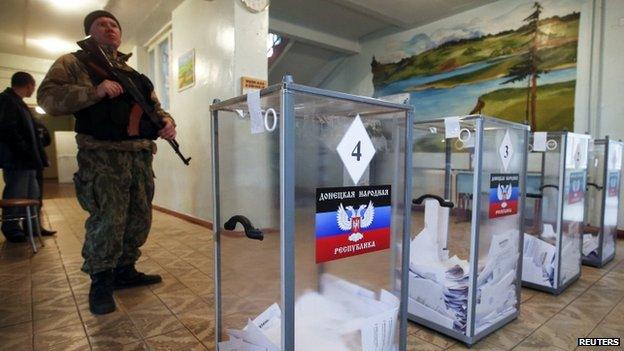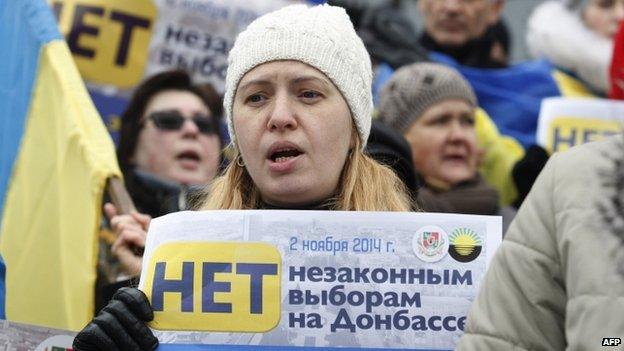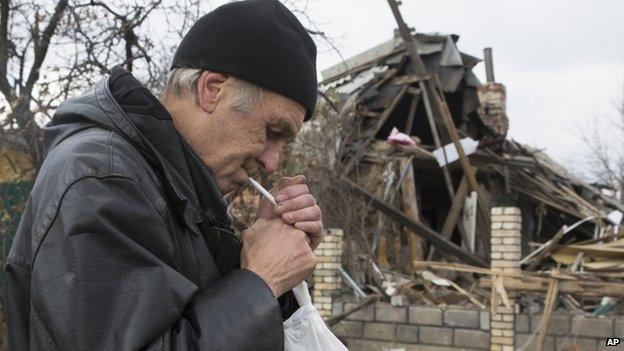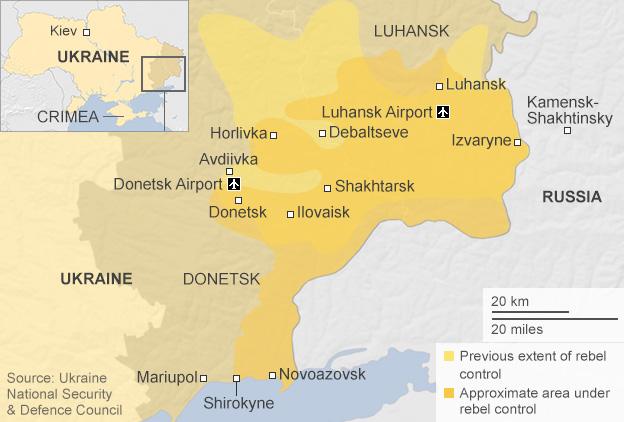Ukraine crisis: Rebel elections obstacle to peace - EU
- Published
Laura Westbrook: "The two front runners are already acting leaders in each region"
The European Union has condemned as "illegal" elections held by pro-Russian separatists in eastern Ukraine.
EU foreign policy chief Federica Mogherini said the polls were "a new obstacle on the path towards peace".
The central government in Kiev also described as a "farce" the polls in the two self-proclaimed people's republics in the Donetsk and Luhansk regions.
Russia said it "respects the will of the people" in the polls, where the two current rebel leaders are set to win.
Self-proclaimed election officials say early results suggest Alexander Zakharchenko will become the regional head in Donetsk, while Igor Plotnisky will secure a victory in Luhansk.
The rebels also staged what they called parliamentary elections in the two regions - collectively known as Donbas.
In other developments on Sunday:
Sources told the BBC that up to 90 military trucks with rocket launchers and other weapons were seen passing through rebel held areas of eastern Ukraine; the convoy bore no military insignia
The Ukrainian military reported an "intensive deployment" of troops and equipment crossing the border from Russia into the east of the country
Rebel commanders said they had held a "people's trial" of two alleged rapists, sentencing one of them to death
Parts of Donbas fell to separatists after months of fierce fighting in eastern Ukraine that ended with the Minsk ceasefire deal in September.
Ukraine and the West accuse Russia of arming the rebels and sending Russian troops across the border. Moscow - which annexed Ukraine's southern Crimea peninsula in March - denies the claim.
'Gross violation'
In a statement, , externalMs Mogherini said the vote in the Donetsk and Luhansk self-proclaimed republics "is illegal and illegitimate, and the European Union will not recognise it".

Armed fighters were seen at polling stations across the two rebel regions

Protesters in Kiev - many of them refugees from Donbas - denounced the rebel-held elections in the east

Months of heavy fighting have left many parts of Donbas in ruins
She reiterated the position of the EU that the rebel territories must abide by September's agreement in Minsk, Belarus, and hold local elections under Ukrainian law.
Rebel leaders earlier said that as independent states they were not required to observe Ukrainian law, and therefore did not participate in Ukraine's national elections last week.
They said three million ballots had been printed for the polls, which would provide for directly elected presidents and parliaments.
"These elections are important because they will give legitimacy to our power and give us more distance from Kiev," Roman Lyagin, election commission chief of the Donetsk region, told the AFP news agency.
Thousands killed
Meanwhile, Ukrainian President Petro Poroshenko called Sunday polls "a farce" and "a gross violation" of the Minsk agreement, which was also signed by Russia.
In Moscow, the Russian foreign ministry said in a statement that it "respects the will of the people of the south-east".
It also called for a "sustainable dialogue" between the authorities in Kiev and the rebels.
On Friday, the US said the authorities in Washington "deplore the intent of separatists in parts of eastern Ukraine to hold illegitimate so-called local 'elections'".
Alexander Zakharchenko, the prime minister of the self-declared government in Donetsk, has won more than 70% of the vote and is set to become the region's head, the rebels say quoting early results. Mr Zakharchenko's party is also winning in the parliamentary poll.
Meanwhile, Igor Plotnitsky, the prime minister of the self-declared government in Luhansk, has secured more than 60% of the vote.
At least 3,700 people have been killed in fighting since armed separatists took over government buildings in a number of towns across the Donetsk and Luhansk regions in April.


Are you in the Donetsk and Luhansk regions? Have you taken part in the elections? Send us your views by emailing haveyoursay@bbc.co.uk, external